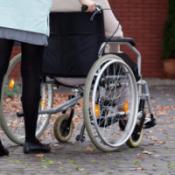 Children with disabilities bring a unique set of challenges, and opportunities, to their families. Depending on the nature of the disability, the challenges can be quite significant. At the same time, though, they have the potential to deepen connection between parents as well as the parent-child bond.
Children with disabilities bring a unique set of challenges, and opportunities, to their families. Depending on the nature of the disability, the challenges can be quite significant. At the same time, though, they have the potential to deepen connection between parents as well as the parent-child bond.
Aside from the energy required to manage a child’s physical and emotional needs, there are often huge financial considerations. A child’s disability may require the family to retrofit their home, or obtain housing that is accessible. In addition, equipment, social services, and health care are often pricey and are not always covered by insurance or entitlement programs. Families able to get some or all of these expenses covered often have to advocate for them on their own, and navigating disorganized government programs associated with these benefits can be an extremely taxing process in its own right.
Because it can be quite time consuming to address these issues, many families are forced to give up large portions of their leisure time. Often, one parent takes on a primary caretaking role with the child, while the other parent becomes the primary provider, deeply involved in his or her work in order to help with the finances. Primary caretakers sometimes have to partially or completely forgo any job aspirations of their own.
If these decisions are not talked about and processed carefully, they can lead to divisions within the family that may become deeply entrenched and long-lasting. Caretakers may feel as if they do an unfair amount of the work for the child, and may feel resentful about having to sacrifice their careers. Providers, meanwhile, may feel isolated within their families, as though everyone is against them, and may come to perceive the bond between the caretaking parent and the child as impenetrable.
The Importance of Communication
To help with this, I suggest that parents openly discuss how caretaking responsibilities are divided. Are there ways to make these responsibilities more evenly managed? What types of feelings does each person have about it? These are important considerations that should be discussed regularly.
Another consideration for parents is the emotional impact of having a child with a disability. Parents sometimes have to adjust their expectations regarding what their child can become, which is frequently experienced as loss and may be accompanied by a mourning process. The process of adjusting expectations to conform to the reality of the circumstances can be challenging and varied depending on the nature of the disability.
Regardless of the specific disability, the family has to come to accept that the child’s life may be limited in some way, and that additional care may be needed for the remainder of the child’s life. This process can be a loaded one and has potential to drive parents apart.
In general, the more ambiguity in the disability, the more difficult it is for the family to adjust. Degenerative diseases, which are less understood than more standard physical disabilities, can be among the most difficult to adjust to. The lack of information about how quickly the disease will develop and impact the child’s life can create enormous anxiety and stress. Cognitive disorders such as mental retardation are also difficult in that parents often cannot tell how much information their children take in.
Regardless of the specific disability, the family has to come to accept that the child’s life may be limited in some way, and that additional care may be needed for the remainder of the child’s life. This process can be a loaded one and has potential to drive parents apart. I suggest that couples set time aside regularly to discuss their feelings about their child’s disability, either in counseling or on their own.
Much is made of accomplishments in Western society, and children are too often measured by what they do instead of who they are. If couples keep an open line of communication and feelings regarding the challenges they face, the experience of parenting a child with a disability can bring them closer together and help them learn to accept and love their child for who they are.
References:
- Boyse, K. (2009). Siblings of Kids with Special Needs. Retrieved from http://www.med.umich.edu/yourchild/topics/specneed.htm
- Reichman, N., Corman, H., & Noonan, K. (2008). The Impact of Child Disability on the Family. Retrieved from http://www.medscape.com/viewarticle/581577_2
- Solomon, A. (2013). Far From the Tree. New York, NY: Scribner.

The preceding article was solely written by the author named above. Any views and opinions expressed are not necessarily shared by GoodTherapy.org. Questions or concerns about the preceding article can be directed to the author or posted as a comment below.

 How to Help Children Cope with a Sibling's Chronic Illness
How to Help Children Cope with a Sibling's Chronic Illness A Survival Guide for Caregivers with Depression and Anxiety
A Survival Guide for Caregivers with Depression and Anxiety Who Should You Tell About Your Chronic Illness?
Who Should You Tell About Your Chronic Illness?

